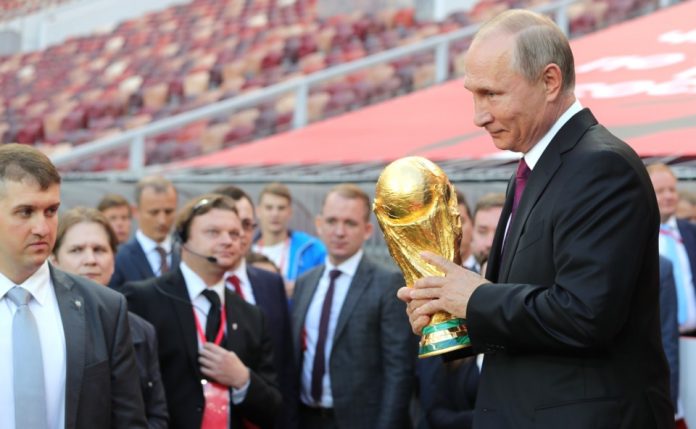![]() The author, Alexey D Muraviev is the Associate Professor of National Security and Strategic Studies, Curtin University. This article was originally published in The Conversation, an independent source of news and views from the academic and research community.
The author, Alexey D Muraviev is the Associate Professor of National Security and Strategic Studies, Curtin University. This article was originally published in The Conversation, an independent source of news and views from the academic and research community.
Even before the final whistle had been blown at the 2018 World Cup, the world media were already proclaiming it a huge success. The New York Times asked whether Russia 2018 was the “greatest of all World Cups”, while The Independent gushed the World Cup helped Russia put on its best face, and “the world smiled back”.
There’s little doubt the World Cup has been a massive victory for Russia, and a double win for President Vladimir Putin. For starters, the tournament has imbued Russians with an immense sense of pride. Even though the Russian team lost in the quarterfinals to Croatia, its unexpected success gave the nation a rare reason to celebrate.
This is a big positive for Putin. Despite his overwhelming victory in March’s presidential election – not a surprise considering the main opposition leader was prevented from running – Putin realises he cannot maintain the loyalty of the Russian people forever.
At a time when Russia faces heightened geopolitical tensions, including the indictment of 12 Russian intelligence officers in the US over Moscow’s interference in the 2016 presidential election, Putin is under enormous pressure to show that he can still be an effective leader and deliver results for the Russian people.
For now, Putin is managing to keep his promises to Russians. In May, he opened the Crimea Bridge – one of Russia’s most ambitious and expensive infrastructure projects in decades.
Despite the sanctions imposed by the West, the Russian economy has continued its recoveryand is growing again. A hike in oil prices has led to projections of a budget surplus of 1 trillion rubles (about US$15.86 billion) this year, with another surplus forecast for 2019.
Soft-power coup
Now, Putin has delivered a successful World Cup that has impressed the world. More than 5 million fans attended the matches, including 2.9 million foreign visitors, which is an impressive figure given all the political controversy that preceded the tournament.
Russia had faced travel warnings, boycotts by some foreign leaders and even radical calls to strip the country of the privilege of hosting the event. There were fears of a politically-motivated backlash against Western tourists, and possible terrorist attacks due to Russia’s involvement in Syria and Ukraine.
However, the tournament came off without a hitch. All the negative publicity before the event kicked off gave way to stories about the football itself and the positive experiences of foreign visitors. French President Emmanuel Macron congratulated Putin on a successful tournament and was captured in a memorable photo wildly celebrating his team’s victory.
Emmanuel Macron breaking every protocol! #FRA #WorldCupFinal pic.twitter.com/QqQXg6wMpi
— Rodolfo Landeros (@RodolfoLanderos) July 15, 2018




